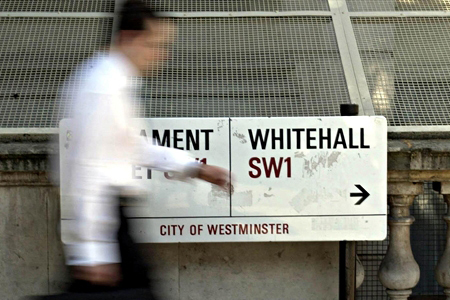Government to test social media identity verification
Critics think method could actually increase cases of identity fraud


The Government Digital Service (GDS) is testing the use of social media accounts to verify the identity of people using government services to stamp out the risk of identity fraud.
Currently, the service called verify uses personal information such as a person's credit history or electronic passport details to verify the identity of someone accessing the services, but it doesn't work for everybody, the GDS explained.
It decided to test the use of social media and discovered that the system's ability to identify adults would increase by nine per cent if social media was used, while for 16 to 25-year-olds, this would increase by 38 per cent.
"Our research suggests that people appear to be becoming more amenable to using online activity verification and allowing certified companies access to their personal online accounts to acquire a verified identity that gives safer, faster access to government services," said the GDS's Industry Engagement lead Livia Ralph wrote in a blog post.
However, not everyone agrees the methods of using social media accounts to verify identities is safe, despite it being a 'compelling' way of making sure the person accessing services is who they say they are.
"In theory, the government's idea of using social media accounts as a means of authenticating a consumer's identity is compelling after all, the vast majority of the population is now signed up to one or more of Facebook, Twitter, Instagram, etc.," Lee Munson, security researcher at Comparitech.com said.
"In practice, however, I am concerned that the increasing use of social sites as proof of identity could actually lead to an increase in identity theft. Given how many people re-use simple, easy to guess, passwords across all their online accounts, it would only require a data breach at one large social media company to leave an awful lot of people in big trouble."
Get the ITPro daily newsletter
Sign up today and you will receive a free copy of our Future Focus 2025 report - the leading guidance on AI, cybersecurity and other IT challenges as per 700+ senior executives
He suggested that if the details were stolen, not only could criminals access the person's social account, but they could also use the details to access government portals to and falsely claim for benefits or apply for a new driving licence under the victim's name, for example.
"While using social accounts to prove who you are to other types of website may be an effective means of authentication, I for one would not trust an association between my Twitter account and the HMRC account I use to pay my taxes," Munson continued. "Instead, I would actually feel far more secure doing things the old-fashioned way, sending documentary proof of who I am via snail mail which is a totally secure alternative isn't it?"

Clare is the founder of Blue Cactus Digital, a digital marketing company that helps ethical and sustainability-focused businesses grow their customer base.
Prior to becoming a marketer, Clare was a journalist, working at a range of mobile device-focused outlets including Know Your Mobile before moving into freelance life.
As a freelance writer, she drew on her expertise in mobility to write features and guides for ITPro, as well as regularly writing news stories on a wide range of topics.
-
 OpenAI's new GPT-4.1 models miss the mark on coding tasks
OpenAI's new GPT-4.1 models miss the mark on coding tasksNews OpenAI says its GPT-4.1 model family offers sizable improvements for coding, but tests show competitors still outperform it in key areas.
By Ross Kelly
-
 Meta just revived plans to train AI models using European user data
Meta just revived plans to train AI models using European user dataNews Meta has confirmed plans to train AI models using European users’ public content and conversations with its Meta AI chatbot.
By Nicole Kobie
-
 The creator effect: Shaping the future of travel
The creator effect: Shaping the future of travelWhitepaper The way forward for the travel sector
By ITPro
-
 Starmer bets big on AI to unlock public sector savings
Starmer bets big on AI to unlock public sector savingsNews AI adoption could be a major boon for the UK and save taxpayers billions, according to prime minister Keir Starmer.
By George Fitzmaurice
-
 UK government targets ‘startup’ mindset in AI funding overhaul
UK government targets ‘startup’ mindset in AI funding overhaulNews Public sector AI funding will be overhauled in the UK in a bid to simplify processes and push more projects into development.
By George Fitzmaurice
-
 UK government signs up Anthropic to improve public services
UK government signs up Anthropic to improve public servicesNews The UK government has signed a memorandum of understanding with Anthropic to explore how the company's Claude AI assistant could be used to improve access to public services.
By Emma Woollacott
-
 The UK’s AI ambitions face one major hurdle – finding enough home-grown talent
The UK’s AI ambitions face one major hurdle – finding enough home-grown talentNews Research shows UK enterprises are struggling to fill AI roles, raising concerns over the country's ability to meet expectations in the global AI race.
By Emma Woollacott
-
 US government urged to overhaul outdated technology
US government urged to overhaul outdated technologyNews A review from the US Government Accountability Office (GAO) has found legacy technology and outdated IT systems are negatively impacting efficiency.
By George Fitzmaurice
-
 Government urged to improve tech procurement practices
Government urged to improve tech procurement practicesNews The National Audit Office highlighted wasted money and a lack of progress on major digital transformation programmes
By Emma Woollacott
-
 Government says new data bill will free up millions of hours of public sector time
Government says new data bill will free up millions of hours of public sector timeNews The UK government is proposing new data laws it says could free up millions of hours of police and NHS time every year and boost the UK economy by £10 billion.
By Emma Woollacott